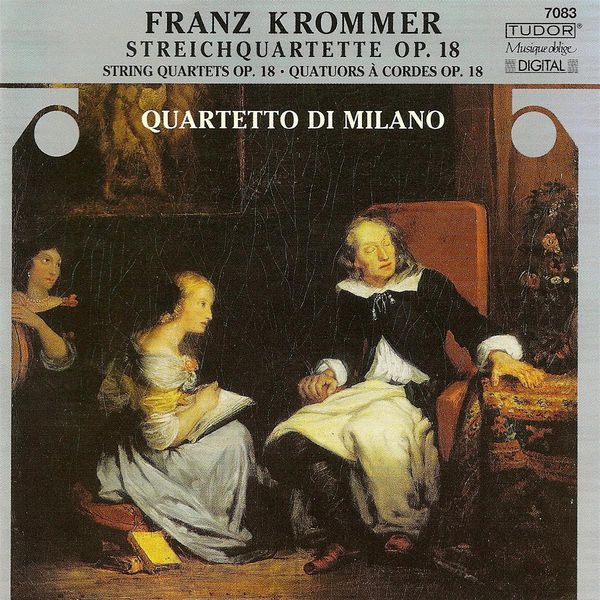
Streaming ilimitado
Escuche este álbum ahora en alta calidad en nuestras apps
Comenzar mi periodo de prueba gratis y escuchar este álbumDisfrute de este álbum en las apps Qobuz con sususcripción
SuscribirDisfrute de este álbum en las apps Qobuz con sususcripción
Idioma disponible: inglés
Viennese composer Franz Krommer was born in Bohemia and also used his birth name, Frantisek Kramar. He was younger than Haydn but slightly older than Beethoven, who at first regarded him as potential competition in the string quartet genre but then stopped worrying. That was because there is little expression in quartets like these; as Quartetto di Milano member Thomas Wicky-Borner put it in his notes, Krommer "hardly ever reveals himself to us in his compositions." Written in the late 1790s, these works belong with the Classical era and not the Romantic, and in the minuet form, where Haydn had said everything that could be said, they are not very interesting. That said, Krommer did absorb one major aspect of Beethoven's string quartet language: like Beethoven's, these are not quartets for amateurs. The first-violin parts require a serious player, and these three quartets in general abound with flashy contrasts in texture and in passages that are big without being quasi-orchestral. The last movement of the String Quartet in D major, Op. 18/1, is an example of a movement that follows Haydn's formal designs but gooses them with fancy fingerwork. The outer movements of all three of these quartets are exciting for the listener, with a vigor that sets them apart from Hummel's expansive structure, and they pose challenges to the players that the Quartetto di Milano surmounts for the most part. Sometimes the group lays on Beethovenian intensity where the music can't really support it, and sometimes when it really digs into the strings they are not perfectly in tune. For the most part, however, this is a good introduction to the string quartets of a nearly forgotten composer of the First Viennese School.
© TiVo
Está escuchando muestras.
Escuche más de 100 millones de pistas con un plan de streaming ilimitado.
Escuche esta playlist y más de 100 millones de pistas con nuestros planes de streaming ilimitado.
Desde $ 124.90/mes

Quartetto di Milano, Ensemble
Quartetto di Milano, Ensemble
Quartetto di Milano, Ensemble
Quartetto di Milano, Ensemble
Quartetto di Milano, Ensemble
Quartetto di Milano, Ensemble
Quartetto di Milano, Ensemble
Quartetto di Milano, Ensemble
Quartetto di Milano, Ensemble
Quartetto di Milano, Ensemble
Quartetto di Milano, Ensemble
Quartetto di Milano, Ensemble
Presentación del Álbum
Viennese composer Franz Krommer was born in Bohemia and also used his birth name, Frantisek Kramar. He was younger than Haydn but slightly older than Beethoven, who at first regarded him as potential competition in the string quartet genre but then stopped worrying. That was because there is little expression in quartets like these; as Quartetto di Milano member Thomas Wicky-Borner put it in his notes, Krommer "hardly ever reveals himself to us in his compositions." Written in the late 1790s, these works belong with the Classical era and not the Romantic, and in the minuet form, where Haydn had said everything that could be said, they are not very interesting. That said, Krommer did absorb one major aspect of Beethoven's string quartet language: like Beethoven's, these are not quartets for amateurs. The first-violin parts require a serious player, and these three quartets in general abound with flashy contrasts in texture and in passages that are big without being quasi-orchestral. The last movement of the String Quartet in D major, Op. 18/1, is an example of a movement that follows Haydn's formal designs but gooses them with fancy fingerwork. The outer movements of all three of these quartets are exciting for the listener, with a vigor that sets them apart from Hummel's expansive structure, and they pose challenges to the players that the Quartetto di Milano surmounts for the most part. Sometimes the group lays on Beethovenian intensity where the music can't really support it, and sometimes when it really digs into the strings they are not perfectly in tune. For the most part, however, this is a good introduction to the string quartets of a nearly forgotten composer of the First Viennese School.
© TiVo
Acerca del álbum
- 1 disco(s) - 12 pista(s)
- Duración total: 01:06:57
- Artista principal: Quartetto di Milano
- Compositor: Franz Krommer
- Sello: Tudor
- Género Clásica

